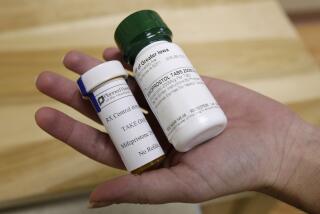Ruling Could Widen Anti-AIDS Drug’s Reach
- Share via
JOHANNESBURG, South Africa — The government on Monday lost a court appeal that could have allowed it to continue restricting access to a key drug for thousands of pregnant women who are HIV-positive.
Reaffirming an earlier ruling, a Pretoria high court ordered the government to provide the anti-AIDS drug nevirapine to all public hospitals with the capacity to use it, even as the government awaits a hearing before the country’s Constitutional Court in May.
The government provides nevirapine at 18 test sites but has refused to expand the program to the rest of the country.
AIDS activists backed by a group of pediatricians launched a court action in December to require nationwide use of nevirapine, arguing that the government had a duty to offer it because the constitution lists health treatment as a right of South Africans.
Under the earlier ruling, the Health Ministry was ordered to return to court by next Sunday to show how it would expand its nevirapine program. Earlier this month, the court again granted an order compelling the government to expand the use of the anti-AIDS drug. But the government requested the court’s permission to appeal the order while the entire case was pending before the Constitutional Court.
High court Judge Chris Botha said Monday that he did not want any more lives lost unnecessarily while the government waited for its appeal to be heard.
“In the end, the choice was between tolerating the loss of life and tolerating inconvenience, no matter how many lives were at stake,” Botha said.
About 200 babies are born HIV-positive every day in South Africa, and studies have shown that nevirapine can reduce the transmission of the virus from mother to child during labor by up to 50%. About 4.7 million of South Africa’s 45 million people are HIV-positive. The government has cited cost, inadequate infrastructure and safety concerns to justify its reluctance to make the drug available at public hospitals and clinics throughout the country.
Some officials have expressed concern over what they believe to be overeagerness on the part of some Western nations and big pharmaceutical companies to require use of nevirapine in South Africa.
“Why is it that some people . . . are forcing us to use nevirapine and not using it themselves?” a senior government official asked during a recent interview. He spoke on condition of anonymity. “You have to ask yourself: Why is there so much pressure on us in South Africa to use nevirapine?”
Government health officials were unavailable for comment on Monday’s court ruling, and it was unclear whether the government would go ahead with an earlier threat to disobey the Pretoria high court.
On Sunday, Health Minister Manto Tshabalala-Msimang told the South African Broadcasting Corp. that she would not heed such a court order because it would violate the constitution.
South African President Thabo Mbeki has been widely criticized for questioning the link between AIDS and HIV, or the human immunodeficiency virus. His aides say his position has been misinterpreted.
But many respected figures in South African society have condemned the government’s response to the AIDS epidemic, including Nobel Peace Prize laureate Archbishop Desmond M. Tutu.
“We have the skills, expertise and resources. So for goodness sakes, stop fiddling,” the South African Press Assn. on Monday quoted Tutu as saying.
Zackie Achmat, chairman of the Treatment Action Campaign, the lobbying group that launched the December court case against the government, added: “There’s just a level of frustration and anger that one has because unfortunately the government’s ideology and obsession about antiretroviral drugs is turning it into an issue about the rule of law.”
The government also is considering withdrawing the registration of nevirapine and halting distribution altogether because of questions that have been raised about how tests of the drug in Uganda were administered.
Botha, the Pretoria judge, said Monday that the government had provided no evidence of side effects.
Said Prudence Mabele, director of the Positive Women’s Network, who has lived with HIV for 10 years: “I get so frustrated by our own government depriving us of the right to live.
“We’re so tired, burying people on a daily basis,” she said.
More to Read
Sign up for Essential California
The most important California stories and recommendations in your inbox every morning.
You may occasionally receive promotional content from the Los Angeles Times.










